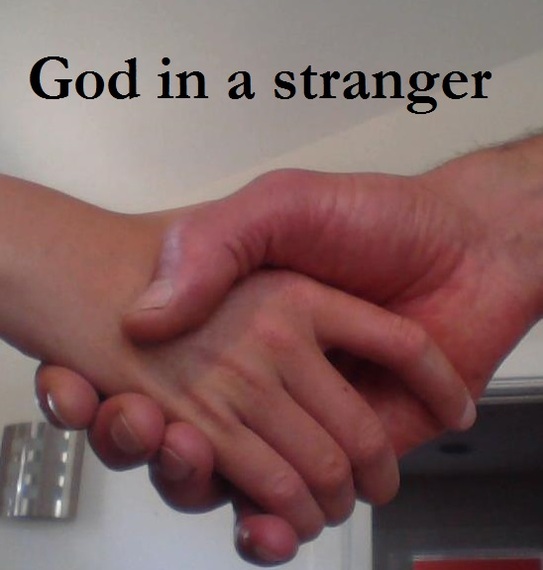"It is hard for mortals to see divinity."
- Homeric Hymn to Demeter, 6th or 7th century BCE
Hospitality is an industry in the United States, not a way of living.
Like most countries, we have laws that set limits on who comes and goes. The New York Times reports that more than 52,000 immigrant children, mostly from Central America and Mexico, have been caught crossing our border just since October. Our politicians want to strengthen border security and speed up deportations. Few prioritize the care and welfare of our uninvited guests.
In our personal lives, rather than welcome each other based on our common humanity, we divide each other into castes -- financial, educational, racial, ethnic, gender-based. We judge and sort, include and exclude. And security is often our rationale. Who really wants to invite the homeless person slumped at the street corner outside the apartment building inside for tea and cookies with the kids?
Yet in ancient Greece such hospitality was the norm. In Homer's Odyssey, even noble families welcomed strangers, vagabonds, beggars into their homes. They were offered food, warmth and shelter and asked to tell the story of where they came from and explain their purpose.
Telemachus saw her long before any one else did... He caught sight of [the goddess] Minerva [disguised as a man] and went straight to the gate, for he was vexed that a stranger should be kept waiting for admittance... "Welcome," said he, "to our house, and when you have partaken of food you shall tell us what you have come for.- The Odyssey, Book I
Telemachus is the son of Odysseus, the long-suffering leader who spent years trying to find his way home after the Trojan War. And Telemachus knows how important it is to treat strangers well -- for in ancient Greece a beggar could easily be a god in disguise. Those who spurn such a god will be punished by divinity while those who show true hospitality will find divine favor.
In this sense, compassion and generosity act as insurance. They are essential tools for living. And indeed they pay off well for Telemachus when his own father, after many years of wandering, shows up at the front door dressed as a mendicant.
What does this have to do with politics?
People get so wrapped up with power and money they forget that politics is about people. In fact, the word comes from the Greek word politēs, which means citizen. In Plato's Republic, the best government of the politēs is one that leads to the common good.
We seem to have forgotten that idea, too, in our rush to protect our individual rights and freedoms. Though these freedoms for the most part do contribute to society, we have grown so isolated and defensive about everything from secure borders to contraceptives to privacy that we cannot seem to unite around anything. Like to buy a high-capacity pistol anyone? Or what about those so caught up with not infringing on the rights of people that they stomp out all encouragement of the natural impulse towards faith? We are fragmented and dysfunctional as a country. On an individual basis, quite a number of us have abandoned any hope of the political situation improving. Our fulminating but impotent government is both cause and symptom.
Isn't it time for a revolution in how we think about each other? Isn't it time to move from what separates us to what unifies us?
I believe our common good stems from our common nature.
So here's my modest proposal, inspired by the ancient Greeks:
In our schools and in our homes, we teach our children how to talk to new people to make them feel welcome. We teach our kids how to ask others for their stories and how to listen. We start a paradigm where all new relationships seek the compassionate knowledge of where someone comes from (including their family heritage) and where they're headed. We create citizens who can leverage person-to-person hospitality into a new sense of community.
And we can start by having the government practice this philosophy:
We ask for the stories of all our new, extra-legal child immigrants -- not to prosecute an immigration case, mind you, but to seek to understand. What is their purpose? How might we help? Imagine what we could learn. Like all visitors, many of these children will return home. But while they are here we will all benefit by taking a cue from Homer and his characters.
Hospitality is a wonderful thing, but I don't believe we have to become a nation of Airbnb providers. The most important front door to open is the one that leads to our hearts and minds. Still, if we all knew how to act as hosts, if we felt it was the cultural norm to treat a stranger with respect and kindness, I believe life in general would get better. We need to adopt compassion, not as a fuzzy ideal, but as our most practical tool to build society by building relationships. When we make space for someone's story, suspicion, uncertainty and fear all begin to dissipate.
Under the new paradigm, of course, voters would boot out any politicians who sought power through divisiveness. And only those who refused to be hospitable would find hospitality denied to them.
After all, I believe that God -- or divine energy -- is in everyone. We're born with it. We all have the capacity to give and receive love. If that's not God-like, I don't know what is. Regular practice in compassion should make it much easier to see this shared divinity.
In India, they've already discovered this truth. According to Wikipedia, the common Hindu greeting "Namaste," is usually spoken with a slight bow. It means simply:
"I bow to the divine in you."
-- Cross posted in "Thinking Philanthropy"

